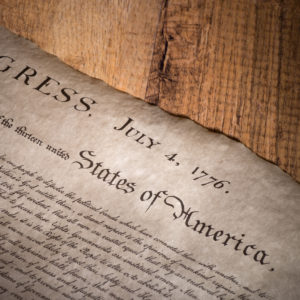“We hold these truths to be self-evident, that all men are created equal, that they are endowed by their Creator with certain unalienable rights, that among these are life, liberty, and the pursuit of happiness …”
These stirring words from our Declaration of Independence are well worth remembering, having just observed the 241st anniversary of our Founders’ declaring our independence from King George III’s rule.
Americans proudly regard the words of our founding documents and the liberty they bought us as a people.
The term “pursuit of happiness” comes across as the vaguest of the inherent rights named there. To the Founders, this term was generally related to “property.”
Digging a little, we find 17th-century political philosopher John Locke’s property rights statement that one “may not, unless it be to do justice on an offender, take away, or impair the life, or what tends to the preservation of the life, the liberty, health, limb, or goods of another.”
In his Second Treatise on Government, Locke wrote, “Every man has a property in his own person: this no body has any right to but himself. The labour of his body, and the work of his hands, we may say, are properly his.”
Locke espoused a person’s sovereignty, liberty and property rights as integrated. Locke held that government illegitimately deprives a person of his property, broadly understood.
The Founders shared this understanding of property rights. This general principle underlies the “long train of abuses and usurpations” listed in the Declaration, as well as the government designed in the Constitution and the rights protected in the Bill of Rights.
The father of our Constitution, James Madison, explained, “Government is instituted to protect property of every sort; as well that which lies in the various rights of individuals as that which the term particularly expresses. This being the end of government, that alone is a just government, which impartially secures to every man, whatever is his own.”
“True liberty, by protecting the exertions of talents and industry, and securing to them their justly acquired fruits, tends more powerfully than any other cause to augment the mass of national wealth,” Alexander Hamilton wrote.
Where did Locke, Madison, Hamilton, Samuel Rutherford in “Lex Rex” (Latin for “The Law and the Prince”) and other political philosophers of the same vein come up with this notion about private property?
One of the sources was the Seventh Commandment: “Thou shalt not steal.”
Others of the Ten Commandments, such as the prohibition of murder (taking away someone’s life) and false witness (stealing someone’s good name or worse), relate to protecting a person’s right to his or her private property, broadly defined. The Bible was one of the most impactful sources in Western civilization, particularly after the Protestant Reformation and the printing press made the Scriptures available to common people in their own language and spread literacy.
We see, then, that private property rights include property in its several forms. Physical property, such as land and the resources on, underneath, and above them, is one form. Personal property is another form, which includes our automobiles, clothing, furniture, other personal possessions, and even ourselves and the fruit of our labor. Intellectual property is a third form of property. It includes the fruits of the labor of one’s mind — writings, musical compositions, inventions, designs, film or theatrical productions, etc.
Thus, when it comes down to it, private property is property, whether it’s physical, personal or intellectual in form.
Further, private rights to one’s own property are inherent rights. Government “secures” these rights, to use the same term as Madison, Hamilton and the preamble to the Constitution (“secure the blessings of liberty to ourselves and our posterity”).
The Founders provided private property protections in the Constitution. Article I Section 8 authorizes Congress to “secure for limited times to authors and inventors the exclusive right to their respective writings and discoveries.” In the Fifth Amendment, the government owes each American due process before depriving one’s “life, liberty or property” and “just compensation” before taking one’s “private property … for public use.”
Every American should understand: Property rights are private rights, inherently due to persons. This is the basis of American government. Property rights are most definitely not public rights that the government grants.
If property rights were government-issued public rights, then a sobering situation would exist. As the old saying goes, what the government giveth, the government taketh away. The government could snatch public rights because such “rights” lack the inherency of “the laws of nature and of nature’s God” the Founders cited in the Declaration.
Property rights are not a conservative or a liberal matter. They are universal. Only, some governments protect their citizens’ private property rights more faithfully than others.
As conservative thinker Russell Kirk said, “To be able to retain the fruits of one’s labor; to be able to see one’s work made permanent; to be able to bequeath one’s property to one’s posterity; to be able to rise from the natural condition of grinding poverty to the security of enduring accomplishment; to have something that is really one’s own — these are advantages difficult to deny.”

